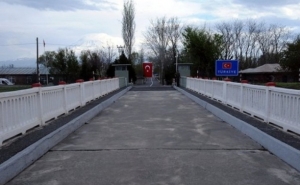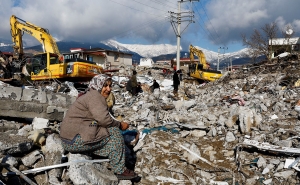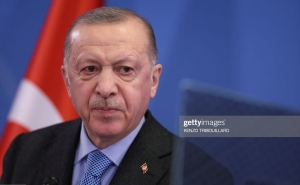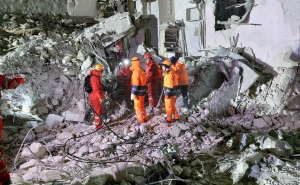 EU-Turkey Deal not Really a Historic One
EU-Turkey Deal not Really a Historic One
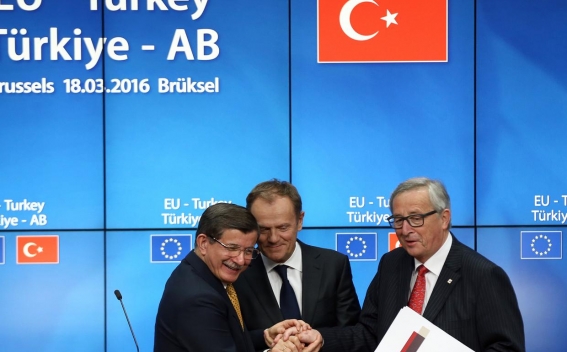
The so-called EU-Turkey "historic" deal has already entered into force with many full of expectations that it will really work and serve its purpose. However, it seems that the expectations from the deal and what it can really bring are quite different.
First, the core of the deal is "one-for-one" principle, which means that for each Syrian returned to Turkey, a Syrian migrant will be resettled in the EU. This process will start from March 20 and the Greek authorities will assess each arrival. There are several problems with this principle, the most vivid one being the principle itself. It seems that we are not talking of human beings, but goods that need to be taken from one place to another, as there is not enough space for them. The essence of the deal is a forced and collective expulsion of migrants from Greece to Turkey, as the big number of migrants threatens to cause great humanitarian hardships. Why is the EU sure that sending so many migrants to Turkey would not cause the same problems for that country and is it so sure that sending thousand of migrants to Turkey would be so easier? These are people, who crossing Turkey aspired to go and settle in the EU, if it did not matter, where they went they would stay in Turkey. So to think that it will be so easy to take them to Turkey without any problem and peacefully, would be naïve.
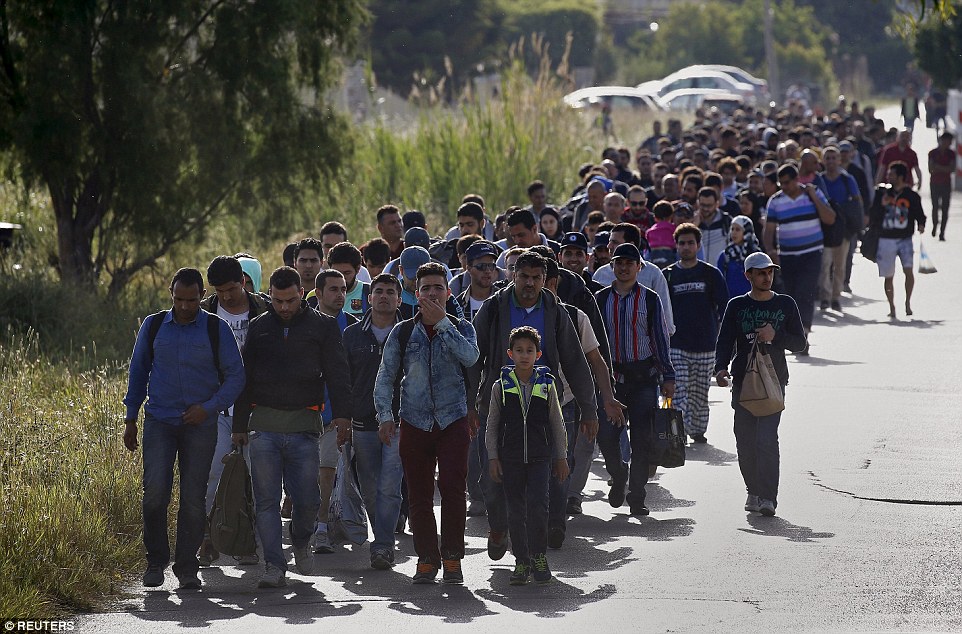
Another problem of "one-for-one" principle is its legality. Many human rights organizations have already voiced concern calling this deal not complying with international law. "The collective expulsion of foreigners is prohibited under the European Convention of Human Rights. An agreement that would be tantamount to a blanket return of any foreigners to a third country, is not consistent with European law, is not consistent with international law," the UNHCR said.
dailymail.co.uk
In its turn Amnesty International has called the deal "morally and legally flawed." "They are saying it does not breach EU law because Turkey is a safe country. By what stretch of the imagination is Turkey a safe country for these people?" Salil Shetty, the secretary general of the UK-based rights organization said. It should be reminded that Turkey has always been criticized for violation of human rights. In the report of Human Rights Watch of 2016, it is noted that the situation of human rights has deteriorated. "The environment for human rights in Turkey deteriorated in 2015 with the breakdown of the Kurdish peace process, a sharp escalation of violence in the southeast, and a crackdown on media and political opponents of the ruling Justice and Development Party (AKP)," the report says. At the beginning of the year the UN Committee has also voiced concern over widespread violations of human rights in Turkey. "In the context of the fight against terrorism, the enforcement of anti-terrorism legislation and security-oriented policies have reportedly resulted in racial profiling of members of the Kurdish community," the Committee stated.
In such a case, when the situation of human rights in Turkey is gradually deteriorating, the logic that the EU is sending migrants to Turkey, moreover, giving this country €3bn to help those migrants, is not understandable. And how is the EU going to check whether the money is being spent for the migrants? It seems the Union has not thought of such a mechanism or at least is not voicing about it. If it is the first case, how is the EU going to be sure that the money it is going to give Turkey will not be used for killing innocent civilians, particularly Kurds, under the pretext of fighting terrorism?
Second, the sides in the framework of the deal have agreed to "re-energise" Turkey's bid to join the European bloc, as well as the EU has agreed that the Turkish nationals should have access to the Schengen passport-free zone by June, but there is a precondition that Turkey should meet 72 long-standing EU criteria. Today Turkey more than anytime is far away of having real opportunities for becoming an EU member state. The question of Kurds that today is very sensitive and the situation is worsening day by day, Turkey’s policy of Armenian Genocide denial, Cyprus issue, violation of human rights, freedom of expression, rule of law… It seems that these are more than enough to think that no progress could be made in the EU-Turkey accession negotiations, moreover, one cannot also talk about visa-free access of Turks to Europe. However, still in November of 2015, when the EU and Turkey had just started negotiations over the migrant crisis, the EU opened one of the chapters of the negotiations.
Thus, it is obvious that the deal in itself is a great problem, another major problem is the relations of Turkey and the EU, which are so artificial that at some point seems to be too strange. The hardships in the EU has made the leaders of the counties resort to some steps they would not do, for example, several years ago. However, these hopeless steps and not well-calculated decisions may even deepen the crisis in the EU.
Other materials on this subject
- EU Countries Who Refuse To Host Refugees Could Pay More For Projects EU countries who refuse to host refugees could instead pay more for EU migration and development projects in Africa, said the head of the European Parliament, Reuters reports.
- Italy Tells Rescue Ships not to Help Refugees in Peril at Sea Officials said the vessels – carrying people from North Africa to Europe – were all in Libyan waters and, therefore, Libyan responsibility.
- EU Leaders Fail on Migration After the meeting, German Chancellor Angela Merkel told reporters that the bloc had a hard job ahead of it to reform asylum rules by a deadline of June next year.
- Is the Construction of Walls by Turkey Also Beneficial for the EU? It is noteworthy that the idea of building walls by Turkey was not criticized by the EU, which, based on its values, has always been in favor of open borders with neighbors, cross-border cooperation.
- Rome Asks to Stop Sending Immigrants to the City According to polls, about half of Italians do not want immigrants to come to their country.
-
 17:08
17:08The regular session of the Anti-corruption Policy Council takes place in Jermuk
-
 15:05
15:05The Prime Minister sends congratulatory messages to the supreme leader of Iran and the President of Iran
-
 11:11
11:11Armenia sends earthquake aid to Turkey
-
 10:43
10:43Commemoration of the Pontiff St. Sahak Partev
-
 09:16
09:16Some roads are closed and difficult to pass in Armenia
-
 19:55
19:55Phone conversation of the Foreign Minister of Armenia with the U.S. Assistant Secretary of State for European and Eurasian Affairs
-
 18:30
18:30Prime Minister Pashinyan and President Khachaturyan meet
-
 18:20
18:20Ararat Mirzoyan with Co-Chairman of the OSCE Minsk Group of France Brice Roquefeuil
-
 17:01
17:01Humans could land on Mars within 10 years, Musk predicts
-
 16:45
16:45France, US urge 'immediate' end to Nagorno Karabakh blockade
-
 16:01
16:01Blockaded Nagorno Karabakh launches fundraiser to support quake-hit Syria
-
 15:59
15:59Earthquake death toll in Turkey rises to 18,342
-
 15:43
15:43Ararat Mirzoyan Held a Telephone Conversation with Sergey Lavrov
-
 15:06
15:06French president rules out fighter jet supplies to Ukraine in near future
-
 14:47
14:475 Day Weather Forecast in Armenia
-
 14:44
14:44President Vahagn Khachaturyan wrote a note in the book of condolences opened in the Embassy of Syria in Armenia
-
 14:20
14:20Azerbaijan’s provocations impede establishment of peace and stability – Armenian FM tells Russian Co-Chair of OSCE MG
-
 12:57
12:57France representation to OSCE: Paris calls on Azerbaijan to restore freedom of movement through Lachin corridor
-
 11:40
11:40Command of Kosovo forces highly appreciated preparation of Armenian peacekeepers
-
 10:16
10:16The United States withdrew from sanctions against Syria for six months the provision of assistance after the earthquake
day
week
month
Humidity: %
Wind: km/h


